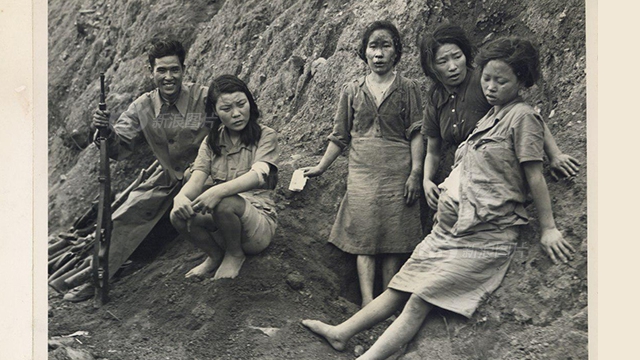【internetten porno izlemek icin t?klan?nca istemeden】It’s All About Representation


By J.K. YAMAMOTO, Rafu Staff Writer
“Broken Blossoms” was the title of a 1919 silent film about a romance between a white woman and a Chinese man. Director D.W. Griffith, seeking to deflect accusations that his film “The Birth of a Nation” was racist, wanted to depict an interracial love story.
However, the star, Lillian Gish, was paired with a white actor in yellowface, Richard Barthelmess — a common practice at the time.
Two Chinese Americans — Moon Kwan, an idealistic family man, and James Leong, a cynical, aspiring filmmaker — were brought in as cultural consultants, but were confronted with the racism that was an integral part of Hollywood. Their story is told in “Unbroken Blossoms,” written by Philip W. Chung and directed by Jeff Liu, which is being presented by East West Players through July 21.
The cast includes Ron Song as Kwan, Gavin Kawin Lee as Leong, Arye Gross as Griffith, Alexander Hellquist as Gish and Conlan Ledwith as Barthelmess.
Song is also a cast member of the Amazon Freevee series “Jury Duty,” in which all of the participants in a trial are actors except for one juror who thinks that the whole thing is real. (The truth is revealed in the final episode.) After the July 14 performance of “Unbroken Blossoms,” Song was joined by the cast and crew of “Jury Duty,” which won an Independent Spirit Award for best ensemble cast in a new scripted series and has received four Emmy nominations.
Remaining performances of “Unbroken Blossoms”: Friday, July 19, at 8 p.m. (with post-show artist talkback); Saturday, July 20, at 2 and 8 p.m. (evening show is ASL-interpreted); Sunday, July 21, at 5 p.m. Info/tickets: (213) 625-7000, [email protected], www.eastwestplayers.org/unbroken

Q&A with Ron Song
Rafu:Before being cast in “Unbroken Blossoms,” were you aware of “Broken Blossoms” and the role that James Leong and Moon Kwan played in it?
Song:Working on “Unbroken Blossoms” has been a wonderful education for me. I was unaware of D.W. Griffith’s film prior to working on this project. Phil, the playwright, provided an online resource of some of the extensive research he had done for his play, which was fascinating to explore. And Jeff Liu, our director, has an encyclopedic knowledge of Asians in Hollywood.
I had no idea Chinese Americans were even involved in Hollywood during the silent film era. It is not something remotely in our public consciousness. We learn about Charlie Chaplin, Lillian Gish, Buster Keaton — these names everyone is familiar with. But James B. Leong and Moon Kwan are names I’ve only become aware of because of this play. And I am grateful to Phil and Jeff and East West Players for opening my eyes to them.
Some of my favorite memories from working on this project has come from the discussions and discoveries made during rehearsals including learning about the iconic scene in (Francis Ford) Coppola’s “Apocalypse Now” with the helicopters flying in to the “Flight of the Valkyries” and its relationship to scenes in “Birth of a Nation.”
And the similarly iconic moment in cinematic history (in “The Shining”) where Jack Nicholson’s character hacks at the door where a terrified Shelley Duvall screams on the other side was a nod to Griffith’s scene in “Broken Blossoms” that is referenced in Phil’s play.
Lastly, we were all surprised to learn that Joaquin Phoenix’s moment in the mirror where he moves his lips with his fingers to smile in “Joker” may have been inspired by Lillian Gish’s smile from “Broken Blossoms.”
These references indicate the power of the cinematic grammar that D.W. Griffith had developed. And what an honor and privilege it is to be a part of this play at this moment in history at this location at East West Players.

Rafu:To do research for the role, did you watch the movie? What were your impressions?
Song:Watching “Broken Blossoms” was an eye-opening moment for me. Silent films, their jerkiness, the frame rates, the history of it all, was something I had not paid much attention to. But watching “Broken Blossoms” and in particular, Richard Barthelmess’ portrayal of Cheng Huan, I got the sense that, yes, indeed, he tried his earnest best for 1919.
Not to say we should give that portrayal a pass or whitewash it, but it deserves a reading through a historical and contextual lens; not with a kinder lens, but one that approaches it with the weight of progress that now sits atop of it.
Rafu:Based on your own experiences, do you think the message of the play is still relevant to Asian Americans in Hollywood today?
Song:I can’t speak for all Asian Americans in Hollywood, but for me, I am absolutely certain that “Unbroken Blossoms” is not only relevant, but remains impactful and hopeful. I am blown away by the stories being told out there today. “Minari” with Steven Yeun. “The Brothers Sun” (with Michelle Yeoh). The upcoming “Interior Chinatown” with Jimmy O. Yang. I can’t wait for that one.
Oh, and “Everything Everywhere All at Once” telling a story of intergenerational trauma from a multiversal point of view is literally everything I could have hoped it would be. I mean, to see Ke Huy Quan in the stylized world of (Wong Kar-wai’s) “Chungking Express” was not a crossover that I was prepared to see. What an absolute heart-warming and joyful moment to see Asians as everything all in one movie.

Rafu:Regarding “Jury Duty,” how did you get cast? What were the guidelines for playing Ken Hyun? What was it like to act without tipping off Ronald Gladden (the non-actor in the cast)? Do you get recognized in public because of the show?
Song:A Second City Hollywood instructor of mine, Allison Bills, called me one day a few years after I completed the conservatory program and asked me if I would be interested in submitting a self-tape audition for an “improvised courtroom comedy.” And I submitted the audition thinking it was completely outside all possibility.
Ken Hyun was a character that I had created for the self-tape (well, his name came later) but he was there as part of the audition. What was so impressive about the leadership on our show was that no one asked me to put on an accent or play the character in a way that I would feel uncomfortable doing. I remember a writer, Marcos Gonzalez, checking in with me during rehearsals making sure that I was comfortable with Ken’s story beats.
And during the shoot, there was a moment that I noticed I had slipped into a slight Korean accent for Ken. It was something that I didn’t even realize I was doing consciously. I remember calling my wife one evening and talking to her about the weight of that unconscious decision and what it would mean as an Asian American in the industry. I did not want Ken to be a callback to the ’80s.
In the end my wife and I discussed that I had to trust my instincts. It was a pivotal moment for me as I was hyper-aware of the weight of representation.
Not tipping off Ronald was not that difficult, to be honest. I just had to remember to not respond to anyone calling him. The internal voice in my head was a repeating line that read, “All work and no play makes Ken a dull boy.” Something along those lines.
I suppose the hardest thing for me was getting the game of Yut (a traditional Korean board game) completed. Originally, it was written as a made-up game. I remembered that I had my family’s Yut game at home and brought it in for the executive producers to see and the legal team to review for copyright issues. Once it cleared, it was ready to go. I knew the rules and the game is fun as hell anyway and in the end we were so fortunate that it all worked out well.
I do get recognized on occasion and each interaction with someone who watched the show has been so positive and affirming. The thing I have been told the most has been that the show was able to get that person through a difficult moment in their lives and I could not be more proud and fulfilled to have been part of a project that can evoke that kind of feeling.
In that way, Moon Kwan and I share that same optimism for the future.








Comments
Leave a Comment